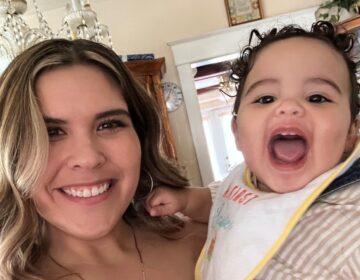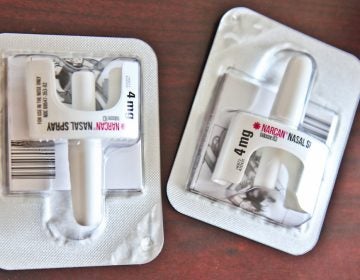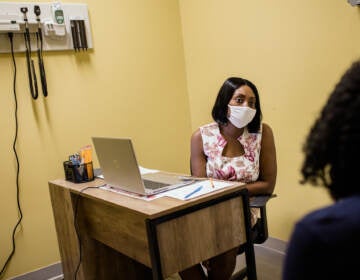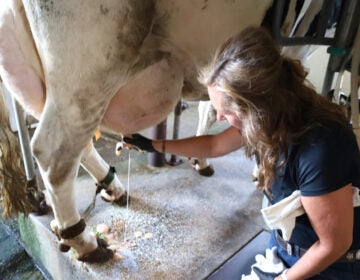Delaware families are still grappling with infant formula shortages, price hikes
Pa. Sen. Bob Casey is pushing legislation to add more competition to the baby formula market after shortages caused prices to spike.
Listen 3:39
Paris (left) and Briante Grant sit inside the Harper's Heart closet in downtown Wilmington with their triplets waiting to get infant formula. (Sarah Mueller/WHYY)
From Philly and the Pa. suburbs to South Jersey and Delaware, what would you like WHYY News to cover? Let us know!
This story was supported by a statehouse coverage grant from the Corporation for Public Broadcasting.
Briante and Paris Grant recently went to downtown Wilmington to pick up baby formula for their three infants. The nonprofit Harper’s Heart runs a small closet tucked away in a corner of the public library. It’s open two days a week and helps parents with babies up to 2 years old with items such as diapers, formula and clothes.
Briante said the 6-month-old triplets eat a lot every month, which means a lot of baby bottles filled with formula.
“Like $1,000, almost, to feed all three,” she said.
The Grants said they struggled to afford infant formula during the past several months because Paris was unemployed. As a high-risk pregnancy, she stayed on bed rest through most of 2023. Federal postal workers are currently ineligible for paid parental leave, although there is active legislation in Congress that would cover them. But it’s unlikely, especially in an election year, that it would pass before the end of 2024.
Briante said trying to feed three babies with the high cost of formula has been rough.
“We weren’t expecting three babies, you know, just one, but three takes a toll on you,” she said. “And then being out of work, not having a maternity leave and a leave without pay really takes a toll on your household.”
After a bacterial contamination led to a massive recall of infant formula in 2022, parents faced widespread shortages and price hikes. Formula is still unaffordable for many new parents. The Bureau of Labor Statistics said in just the past year, the cost of baby food and formula has gone up more than 8%.
The First State is giving away the last of the infant formula it had ordered from overseas last year as part of an initiative by Lt. Gov. Bethany Hall-Long to get the food to desperate parents unable to find it on grocery shelves.
That effort saw 44,000 canisters of formula shipped into Delaware from Australia last year. Parents in high-poverty areas were first limited to one 28-ounce can, but that limit has since been removed. There are about 12,500 canisters left, with statewide distribution points. This size canister can produce 20–24 bottles, Hall-Long said.
One of those distribution partners is the Food Bank of Delaware. CEO Cathy Kanefsky said that while supply has rebounded, scarcity is still an issue.
“If you don’t find it, call the Food Bank because we can make sure that we do have it,” she said at a Harper’s Heart event to raise public awareness of the state’s remaining cache of formula. “We do mobile distributions throughout the communities in Delaware as well. But again, we want to make sure that it’s not in a truck or on a shelf, it’s in your home.”
Abbott Nutrition voluntarily recalled several infant formulas in early 2022, leading to nationwide supply disruptions across the U.S. In a report issued by the Federal Trade Commission in March, the agency blamed the concentration of the market as a contributing factor. Abbott, Mead Johnson and Gerber controlled about 84% of the manufacturing of formula that year.
In a statement accompanying the report, members of the FTC said “families often have little choice when it comes to infant formula brands and can be highly sensitive to price hikes and supply disruptions.” There are also specialty types of formulas which can be more sensitive to supply changes because they help babies who have special needs, including digestive issues, allergies and metabolic disorders.
But recently introduced legislation in the U.S. Senate could help prevent future shortages.
U.S. Sen. Bob Casey of Pennsylvania has proposed new legislation aimed at eliminating the need to seek formula from foreign companies. Under his bill, smaller manufacturers looking to enter the market could receive either an investment tax credit or a production tax credit.
Casey said there’s no way to de-consolidate the market without offering a tax credit as an incentive. His plan would allow smaller companies to earn up to $150 million through the investment credit to offset production costs.
“This is the way to get there,” he said. “We just don’t want to have a circumstance where the most powerful country in the world can’t produce enough infant formula to secure the development of our children.”
Briante and Paris said next year their babies will be on solid foods and regular milk. Without the triplets needing infant formula, they said they believe that will whittle down the cost of the family’s monthly grocery bill.
WHYY is your source for fact-based, in-depth journalism and information. As a nonprofit organization, we rely on financial support from readers like you. Please give today.







